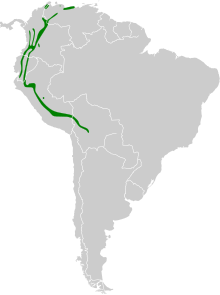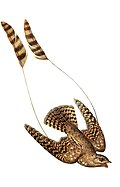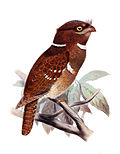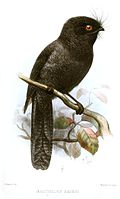Booted racket-tail
| Booted racket-tail | |
|---|---|

| |
| Male white-booted racket-tail | |
| Scientific classification | |
| Domain: | Eukaryota |
| Kingdom: | Animalia |
| Phylum: | Chordata |
| Class: | Aves |
| Clade: | Strisores |
| Order: | Apodiformes |
| Family: | Trochilidae |
| Tribe: | Heliantheini |
| Genus: | Ocreatus Gould, 1846 |
| Type species | |
| Trochilus addae[1] Bourcier, 1846
| |

| |
| Distribution of the genus Ocreatus in green | |
The booted racket-tails are a small group of hummingbirds in the genus Ocreatus that was long considered to have only one species, O. underwoodii. They are native to cloud forest edges in the South American Andes and Maritime Andes. They are relatively small (even compared to most other hummingbirds) and primarily iridescent green with white or rufous-buff leg-puffs ("boots"). The leg-puffs are more conspicuous in males, which also have a pair of dark bluish racket-shaped extensions to the tail.[2]
Taxonomy
[edit]The genus Ocreatus was described by John Gould in 1846. During the 19th century, several populations were described as different species, but since the mid-20th century authorities generally only recognized a single widespread species, O. underwoodii, with several subspecies. Research published in 2016, however, argued that three subspecies groups, addae, annae and peruanus, that are mostly allopatric (only peruanus and underwoodii have ranges that are known to very locally come into contact) were sufficiently different for raising them to species level.[2] The research results have been mostly accepted by the International Ornithological Union, with more data required for the species status of Anna's racket-tail (annae), which they instead regard as a subspecies of O. addae.[3] The American Ornithological Society has yet to recognize the split and continue to place all in a single widespread species.
Species
[edit]The genus contains three species:[4]
| Common name | Scientific name and subspecies | Range | Size and ecology | IUCN status and estimated population |
|---|---|---|---|---|
| Peruvian racket-tail | Ocreatus peruanus (Gould, 1849) |
eastern Ecuador and northern Peru
|
Size: Habitat: Diet: |
LC
|
| Rufous-booted racket-tail | Ocreatus addae (Bourcier, 1846) |
southern Peru (annae) and Bolivia (addae) | Size: Habitat: Diet: |
LC
|
| White-booted racket-tail | Ocreatus underwoodii (Lesson, 1832) Five subspecies
|
northwestern Venezuela, Colombia and western Ecuador
|
Size: Habitat: Diet: |
LC
|
References
[edit]- ^ "Trochilidae". aviansystematics.org. The Trust for Avian Systematics. Retrieved 2023-08-05.
- ^ a b Schuchmann, Karl-L.; Weller, André-A.; Jürgens, Dietmar (2016). "Biogeography and taxonomy of racket-tail hummingbirds (Aves: Trochilidae: Ocreatus): Evidence for species delimitation from morphology and display behavior". Zootaxa. 4200 (1): 83. doi:10.11646/zootaxa.4200.1.3. PMID 27988640.
- ^ "Proposed Splits/Lumps « IOC World Bird List".
- ^ Gill, Frank; Donsker, David; Rasmussen, Pamela, eds. (July 2020). "Hummingbirds". IOC World Bird List Version 10.2. International Ornithologists' Union. Retrieved 2 January 2020.
See also
[edit]- Marvelous spatuletail (Loddigesia mirabilis) - another Andean hummingbird with a somewhat similar tail
- Racket-tailed coquette (Discosura longicaudus) - a hummingbird of northeastern and eastern South America with a somewhat similar tail












